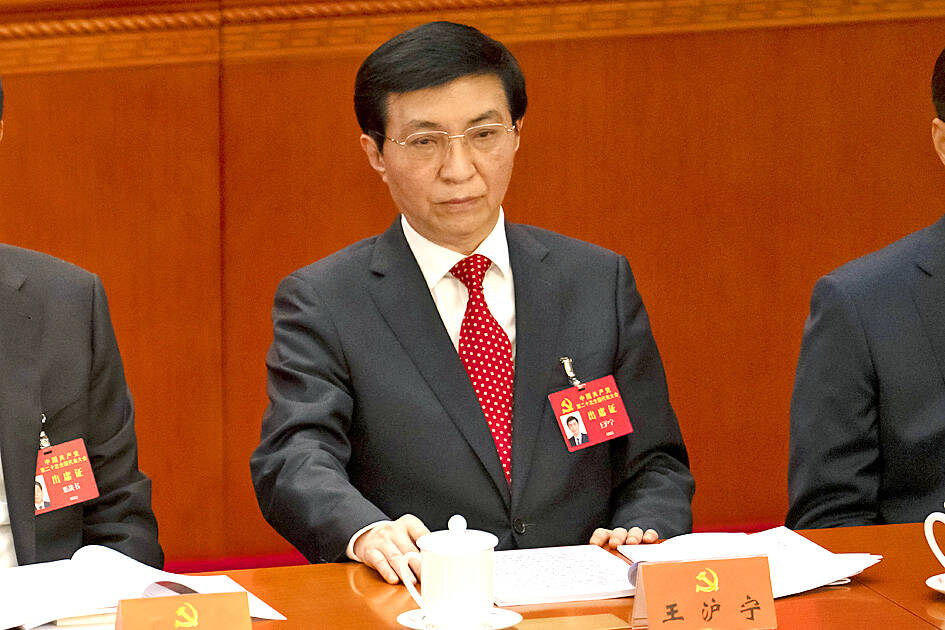Chinese President Xi Jinping (習近平) is aware that Beijing’s treatment of Hong Kong has weakened any possible sentiment for a “one country, two systems” arrangement for Taiwan, and has instructed Chinese Communist Party (CCP) politburo member Wang Huning (王滬寧) to develop new ways of defining cross-strait relations, Japanese news magazine Nikkei Asia reported on Thursday.
A former professor of international politics at Fu Dan University, Wang is expected to develop a dialogue that could serve as the foundation for cross-strait unification, and Xi plans to use the framework to support a fourth term as president, Nikkei Asia quoted an anonymous source as saying.
Wang is thought to be the principal force behind the CCP’s messaging campaigns. He has been credited with developing former Chinese leader Jiang Zemin’s (江澤民) guiding sociopolitical programs while he was CCP general secretary, and is said to have crafted former Chinese president Hu Jintao’s (胡錦濤) scientific development policies before designing and executing many of Xi’s social ideals.

Photo: AP
The “one country, two systems” formula that granted a degree of autonomy to the Hong Kong Special Administrative Region was first developed by the former Chinese leader Deng Xiaoping (鄧小平), and it was believed to be the CCP’s intention to use Hong Kong’s framework as a template for a peaceful unification with Taiwan.
The CCP’s leaders are aware that China’s increasingly tough stance with Hong Kong has become a powerful argument for Taiwanese to demonstrate that the system would be unworkable in Taiwan, the report said.
However, Xi feels at liberty to break from Deng’s policy to develop his own peaceful unification framework, it said.
The report quoted a source familiar with CCP internal affairs as saying that an armed invasion of Taiwan is not being considered by Beijing, and is focused on plans to unify Taiwan diplomatically.
Success of the new concept would be gauged before Beijing considered military options, the source said.
Cross-strait tensions that have been heightened since August last year make it difficult to determine when Beijing might finish developing its new framework, the source added.

‘DENIAL DEFENSE’: The US would increase its military presence with uncrewed ships, and submarines, while boosting defense in the Indo-Pacific, a Pete Hegseth memo said The US is reorienting its military strategy to focus primarily on deterring a potential Chinese invasion of Taiwan, a memo signed by US Secretary of Defense Pete Hegseth showed. The memo also called on Taiwan to increase its defense spending. The document, known as the “Interim National Defense Strategic Guidance,” was distributed this month and detailed the national defense plans of US President Donald Trump’s administration, an article in the Washington Post said on Saturday. It outlines how the US can prepare for a potential war with China and defend itself from threats in the “near abroad,” including Greenland and the Panama

A wild live dugong was found in Taiwan for the first time in 88 years, after it was accidentally caught by a fisher’s net on Tuesday in Yilan County’s Fenniaolin (粉鳥林). This is the first sighting of the species in Taiwan since 1937, having already been considered “extinct” in the country and considered as “vulnerable” by the International Union for Conservation of Nature. A fisher surnamed Chen (陳) went to Fenniaolin to collect the fish in his netting, but instead caught a 3m long, 500kg dugong. The fisher released the animal back into the wild, not realizing it was an endangered species at

The High Prosecutors’ Office yesterday withdrew an appeal against the acquittal of a former bank manager 22 years after his death, marking Taiwan’s first instance of prosecutors rendering posthumous justice to a wrongfully convicted defendant. Chu Ching-en (諸慶恩) — formerly a manager at the Taipei branch of BNP Paribas — was in 1999 accused by Weng Mao-chung (翁茂鍾), then-president of Chia Her Industrial Co, of forging a request for a fixed deposit of US$10 million by I-Hwa Industrial Co, a subsidiary of Chia Her, which was used as collateral. Chu was ruled not guilty in the first trial, but was found guilty

DEADLOCK: As the commission is unable to forum a quorum to review license renewal applications, the channel operators are not at fault and can air past their license date The National Communications Commission (NCC) yesterday said that the Public Television Service (PTS) and 36 other television and radio broadcasters could continue airing, despite the commission’s inability to meet a quorum to review their license renewal applications. The licenses of PTS and the other channels are set to expire between this month and June. The National Communications Commission Organization Act (國家通訊傳播委員會組織法) stipulates that the commission must meet the mandated quorum of four to hold a valid meeting. The seven-member commission currently has only three commissioners. “We have informed the channel operators of the progress we have made in reviewing their license renewal applications, and